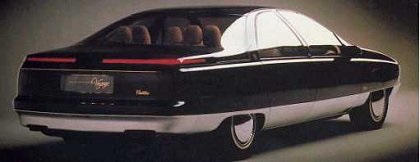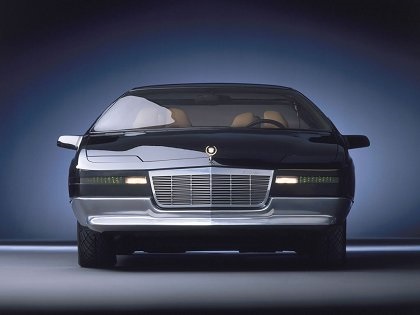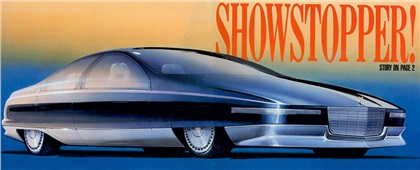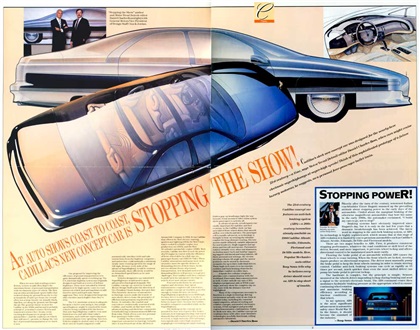Cadillac Voyage, 1988
As futuristic as the 1988 Cadillac Voyage concept car design was, fans
of 1950's cars could detect more than one styling element in the Voyage
skin that harked back to that era.
The
grille of the 1988 Cadillac Voyage concept car brought back memories of
Caddys past, and previewed the marque's early 21st-century look.
The tightly-knit tapered-side grille, for one, could have been mounted
on a Caddy of earlier vintage without creating a stir. The black
exterior paint and the sheer size of the Cadillac Voyage concept car
majestically conveyed Cadillac"s reputation for bulk and strength.
Cadillac's 1988 Voyage concept car was an auto-show star.
Matching (removable) front and rear fender skirts had never been seen on
regulation Caddies, of course, but almost looked like they might have
been. Taking advantage of contemporary technology, the front skirts were
designed to move outward automatically when the car had to turn
abruptly. They weren"t stuck on just for show, but to help create an
amazingly low drag coefficient (only 0.28) for such a large vehicle.
Voyage"s upper greenhouse, from the base of the windshield all the way to the bottom of the tail lamps, was a single, continuous sheet of tinted glass -- that"s visibility! High-intensity tail lamps and turn signal indicators weren"t plain old bulbs, but then-modern-day Light Emitting Diodes. Forming a continuous strip, the rear lamps were hidden under glass; only the rear-vision video camera was visible, sending views from the back to a screen in the driver"s compartment.
Voyage"s upper greenhouse, from the base of the windshield all the way to the bottom of the tail lamps, was a single, continuous sheet of tinted glass -- that"s visibility! High-intensity tail lamps and turn signal indicators weren"t plain old bulbs, but then-modern-day Light Emitting Diodes. Forming a continuous strip, the rear lamps were hidden under glass; only the rear-vision video camera was visible, sending views from the back to a screen in the driver"s compartment.
Cadillac Voyage, 1988
High-visibility automatic flashers replaced customary reflectors, to be
sure oncoming traffic would see the Cadillac Voyage if it were parked at
roadside during the night. After all, even a 200-mph
electronically-controlled machine might break down now and then.
Windshield wipers were tucked away beneath a cover at the windshield base, rising on an elevator when needed. Both inside and outside mirrors were created to dim automatically to protect the driver from glare as bright lights approached.
Getting into the car required no keys or locks; only the knowledge of a code for the keyless entry system. Pick the right one and the doors would open, front windows slid down a couple of inches, and seat and steering column moved aside to allow graceful entry. Back windows also tilted outward.
Windshield wipers were tucked away beneath a cover at the windshield base, rising on an elevator when needed. Both inside and outside mirrors were created to dim automatically to protect the driver from glare as bright lights approached.
Getting into the car required no keys or locks; only the knowledge of a code for the keyless entry system. Pick the right one and the doors would open, front windows slid down a couple of inches, and seat and steering column moved aside to allow graceful entry. Back windows also tilted outward.

Cadillac Voyage, 1988
Shut the door to the Cadillac Voyage concept car and the seat would
shift into correct position for the driver who happened to be filling
its cushion -- having memorized three different settings. And if that
position wasn"t quite right, more than 20 pneumatic and mechanical
adjustments allowed all the refinements anyone could possibly want.
Mirrors adjusted themselves, too, for each driver who"d requested a
setting.
Cadillac Voyage, 1988
The 1988 Cadillac Voyage concept car development by no means ignored the
big sedan"s luxurious cabin. The same attention was lavished on the
interrior of the 1989 Cadillac Solitaire concept car, too.

Cadillac Voyage, 1988
For example, once inside the Voyage, cold wintry mornings could quickly
be forgotten as the pre-heated seats emitted their warmth to back and
backside. And if that weren"t enough, a little massage was available to
get the blood going before the day got underway; or get rid of those
annoying "pins and needles" feelings during a long drive. Business calls
could be handled without even touching the built-in phone, since it
recognized the driver"s voice and dialed numbers automatically.
Cadillac Voyage, 1988 - Clay model. Automotive News, January 1988.
Unfamiliar with where you"re going? Not a problem. The ETAK navigation
system was ready to display a present location and destination within a
map on a color video screen, even picking out the best route to follow.
Cadillac Voyage, 1988 - Interior
Created under the direction of Vice President Charles M. Jordan, the
Cadillac Voyage concept car was more than a mere styling exercise from
the General Motors Design Staff. It was created as a working prototype
that could hold four passengers. Cadillac chief John O. Grettenberger
called it "a rolling laboratory designed to evaluate future Cadillac
vehicle concepts." An electronic 4-speed transmission delivered power to
all four wheels.
Cadillac Voyage, 1988 - Design Sketch
If a four-door concept car for the future attracted so many enthusiastic
gapers, why not a similarly stimulating two-door coupe? Thus arrived
the Cadillac Solitaire concept car, which toured the 1989 show circuit.
Both its electronic/mechanical features and form evolved from the prior
Voyage. Shifting to a deep maroon color scheme helped disguise the fact
that the grille, the front and rear movable skirts, and a host of other
details were little more than carryovers.
Cadillac Voyage, 1988 - Interior Design Sketch
An expansive dome of tinted, safety net glass stretched from the
Cadillac Solitaire"s windshield base to the rear passenger area,
intended to provide not only superior visibility but the feeling of a
convertible.
Cadillac Voyage, 1988 - Design Process
The windshield darkened automatically as soon as the bright sun came
out, while the dome was controlled by the driver to block out a portion
of the sun"s rays. That way, the interior could stay cooler on hot,
sunny days, and use the sun"s warmth to keep the interior warm on cold
days.














